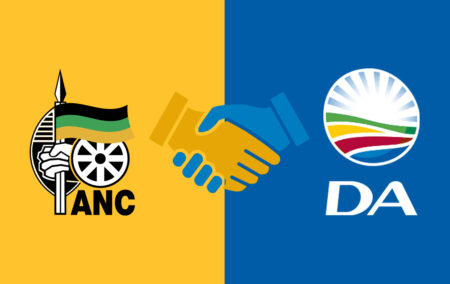As the ANC mulls over its post-election options, the DA has emerged as one of its strongest coalition options.
The DA shares with the ANC a commitment to constitutionalism that Jacob Zuma’s MK Party lacks. And its focus on pro-growth policies and effective governance offers the ANC a way back into the voters’ hearts by improving their material circumstances – a benefit that the dirigiste, anti-market policies of the EFF conspicuously do not.
For both these reasons, the ANC will be giving the DA option serious consideration when its senior leaders meet to discuss the way forward. The cautious signalling from DA leader John Steenhuisen on Sunday evening hints that the DA leadership, too, is open to considering an arrangement with the ANC, but is as yet undecided on how it might be structured.
Two basic options are on the table: either an arms-length “confidence and supply” agreement or a fully committed coalition deal. Each option offers both parties opportunities while threatening perils and pitfalls. This means that both parties will think long and hard about which option is best for them. Yet ultimately a decision must be made.
Here is why I think that the ANC and DA should commit to a coalition.
South Africa finds itself at a perilous crossroads in its history. Fifteen years of low growth and investment have degraded South Africa’s economy and infrastructure, creating widespread immiseration and high unemployment.
Precipitous drop
These consequences of the ANC’s policy choices are what led to its precipitous drop in the voters’ favour – and to the emergence of a dangerous new foe in the form of the MK Party, which is positioning itself to exploit the weakened state.
At this moment of peril, leaving the ANC alone to face the threat from the populist left – giving it only arm’s length, tentative support – is not enough. The political ground has shifted and the parties have to adjust their stances in response.
The realignment of South African politics juxtaposes the moderate middle, as represented by the DA and the MPC parties, against the radical left, as embodied in the EFF and MK. The ANC must choose which side it is on. The DA should make that choice easier by offering to join the ANC on the battlefield, rather than sniping from the safety of the opposition sidelines.
Growth
The mission is clear: to protect the constitution and return the economy to growth. This is something the two parties can agree on as a basis for a working coalition. They need to support each other in opposing those who want to prevent that from happening. And the DA should use the opportunity to show that it can translate the successes it achieved in governing the Western Cape to the national stage.
Both Jacob Zuma and Julius Malema have a highly developed sense of strategic opportunity. They will exploit any dithering and division on the part of the ANC and DA to the utmost. An ANC that is distracted by a DA that both supports it (through confidence and supply) and opposes it (by remaining in opposition) is at great risk of succumbing to the wiles of the EFF and MK.
Should that happen, the ANC would be lost to the pro-growth cause. The DA would find itself in a lonesome position, without a partner of substance to work with on protecting the constitution and growing the economy. South Africa could lose its best pro-growth opportunity in decades.
That is a danger the DA should avoid. And that is why it should join a coalition with the ANC: to get in the ring on the side of the ANC to support the constitutionalists and the pro-growth cause against the very real threat posed by populists and left-wing authoritarians.
[Image: Bonginkosi Tekane]
If you like what you have just read, support the Daily Friend

